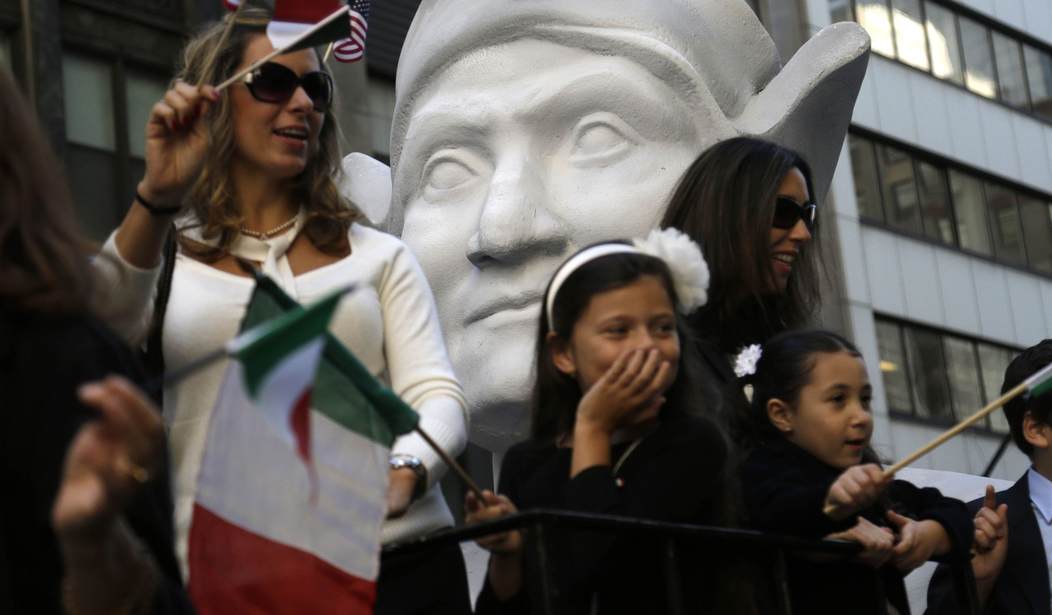Battles over Columbus Day aren't really about Christopher Columbus at all -- they're about whether America should exist.
"Columbus's journey carried thousands of years of wisdom, philosophy, reason, and culture across the Atlantic into the Americas — paving the way for the ultimate triumph of Western civilization less than three centuries later on July 4, 1776," President Donald Trump says in his Columbus Day proclamation.
Yet that's why the holiday has so many enemies.
Unlike progressive movements of decades past, today's ideological left doesn't particularly want to lay claim to America's heritage.
Even the Communist Party USA once made an effort to brand its radical creed as 20th-century "Americanism."
Karl Marx himself saw the spread of bourgeois civilization as inevitable and even necessary for creating the conditions of worldwide class revolution.
That civilization is what opponents of Columbus Day reject.
Columbus extended the horizons of Western civilization, which is what the holiday in his name recognizes.
Yes, Italian Americans are especially proud of Columbus, a son of Italy and the seafaring republic of Genoa in particular.
But this isn't just an ethnic holiday — everyone whose ancestors weren't already in this hemisphere when Columbus arrived owes the heroic explorer a debt of gratitude.
By forging permanent ties between the Americas and the wider world, Columbus made our lives and way of life possible.
He opened the way not only for Europeans and Christians like himself but ultimately for people of every land and religion to seek freedom, safety and opportunity in a New World without the class constraints and ancient hatreds of the Old World.
In 1492, the same year Columbus sailed into the uncharted Atlantic, his Spanish royal patrons banished Jews from their land-yet because of Columbus's discoveries, Jews would one day find a haven half a world away from the persecutions they long endured elsewhere.
Columbus didn't introduce slavery to the Americas — the natives already had that evil institution before Europeans came.
He did, however, set in motion the end of the New World's own characteristic horrors, such as the Aztecs' human sacrifices and the cannibalism practiced by the Caribs.
Columbus deserves no blame for the diseases that devastated native populations: Sooner or later, these peoples with no immunity to infections which most of the human race had contended with for generations would have suffered the same tragic fate from contact with the outside world.
The Black Death that ravaged medieval Europe came from abroad, too, from contact with Asia — only in the modern world, as a result of Western science and medicine, is humanity free to travel and trade with little fear pestilence will follow.
And when new diseases like COVID do spread around the globe, the resources of civilization that Columbus helped spread are able to meet the threat.
Columbus Day is not meant to be a saint's day.
Like our nation's Founding Fathers, Columbus was flawed, and his reputation bears the stains of his age's evils, including slavery.
But like them, Columbus was an exemplar of much that is best in our character.
He was the first and, in many ways, an archetypal American, an enterprising immigrant who risked everything for a new hope, who not only set out to improve his family's lot in life but understood his work as service to God.
He was our first pioneer, and he's been honored in the United States since the late 18th century, when New York City's Society of Tammany — also known as the Columbian Order — began celebrating his October birthday.
The federal holiday is more recent, with Congress first asking Franklin Roosevelt to proclaim a day for Columbus in the 1930s, and the statutory holiday established in 1971.
But it's the pitched opposition to Columbus that's really novel.
Mayor Eric Adams has had to urge New York's Landmarks Preservation Commission to grant protected status to the admiral's statues, so Zohran Mamdani can't tear them down if he becomes mayor.
On college campuses and in state capitals across the country, left-wing activists call for replacing Columbus Day with an "Indigenous Peoples Day."
It's an ironic demand since the very notion of indigenous peoples only makes sense from a Eurocentric point of view.
Because every "indigenous" group at some point migrated from someplace else — usually displacing older, more indigenous populations in the process — the term doesn't refer to the original inhabitants of any land.
Instead, it means populations predating the arrival of Europeans or other ideologically disfavored groups: Jews certainly aren't indigenous enough to the Holy Land for the "anti-colonialist" left.
Columbus Day celebrates the birthday of Western civilization as something not confined only to Europe.
Yet in our country, all too many of this civilization's spoiled heirs regret the very achievements that have made their existence possible, including the supreme achievements of Christopher Columbus.
Editor’s Note: The Schumer Shutdown is here. Rather than put the American people first, Chuck Schumer and the radical Democrats forced a government shutdown for healthcare for illegals. They own this. Help us continue to report the truth about the Schumer Shutdown. Use promo code POTUS47 to get 74% off your VIP membership.









Join the conversation as a VIP Member